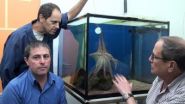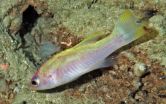(Press-News.org) Premature babies' risk of brain injury is influenced by their genes, a new study suggests.
Researchers have identified a link between injury to the developing brain and common variation in genes associated with schizophrenia and the metabolism of fat.
The study builds on previous research, which has shown that being born prematurely – before 37 weeks – is a leading cause of learning and behavioural difficulties in childhood.
Around half of infants weighing less than 1500g at birth go on to experience difficulties in learning and attention at school age.
Scientists at the University of Edinburgh, Imperial College London and King's College London studied genetic samples and MRI scans of more than 80 premature infants at the time of discharge from hospital.
The tests and scans revealed that variation in the genetic code of genes known as ARVCF and FADS2 influenced the risk of brain injury on MRI in the babies.
Researchers say that future studies could look at how changes in these genes may bring about this risk of – or resilience – to brain injury.
Premature births account for 10 per cent of all births worldwide, according to experts.
Earlier research has shown that being born preterm is closely related to abnormal brain development and poor neurodevelopmental outcome.
However, scientists say that they do not fully understand the processes that lead to these problems in some infants.
Dr James Boardman, scientific director of the Jennifer Brown Research Laboratory at the Medical Research Council Centre for Reproductive Health at the University of Edinburgh, said: "Environmental factors such as degree of prematurity at birth and infection play a part, but, as our study has found, they are not the whole story and genetic factors have a role in conferring risk or resilience.
"We hope that our findings will lead to new understanding about the mechanisms that lead to brain injury and ultimately new neuroprotective treatment strategies for preterm babies."
INFORMATION:
The study, published in the journal Pediatrics, was funded by NIHR Imperial College Biomedical Research Centre.
For further information, please contact: Eleanor Cowie, Press and PR Office,
Tel + 44 131 650 6382; Eleanor.Cowie@ed.ac.uk
Genes play key role in brain injury risk for premature babies
Premature babies' risk of brain injury is influenced by their genes, a new study suggests
2014-05-19
ELSE PRESS RELEASES FROM THIS DATE:
Engineers find way to lower risk of midair collisions for small aircraft
2014-05-19
Researchers at North Carolina State University have developed new modifications for technology that helps pilots of small aircraft avoid midair collisions. The modified tools significantly improved pilot response times in making decisions to avert crashes.
At issue are "cockpit displays of traffic information" (CDTIs). These are GPS displays used by private pilots to track other aircraft in their vicinity. However, pilots often focus on the closest aircraft on the display – a habit that can pose a significant hazard.
If the pilot of Plane A sees two planes on the CDTI, ...
How octopuses don't tie themselves in knots revealed by Hebrew University scientists
2014-05-19
An octopus's arms are covered in hundreds of suckers that will stick to just about anything, with one important exception: those suckers generally won't grab onto the octopus itself, otherwise the impressively flexible animals would quickly find themselves all tangled up.
Now, researchers from the Hebrew University of Jerusalem report that they discovered how octopuses manage this feat, even as the creatures' brains are unaware of what their arms are doing. A chemical produced by octopus skin temporarily prevents their suckers from sucking.
"We were surprised that ...
The spot-tail golden bass: A new fish species from deep reefs of the southern Caribbean
2014-05-19
Smithsonian scientists describe a colorful new species of small coral reef sea bass from depths of 182–241 m off Curaçao, southern Caribbean. With predominantly yellow body and fins, the new species, Liopropoma santi, closely resembles the other two "golden basses" found together with it at Curaçao: L. aberrans and L. olneyi.
The scientists originally thought there was a single species of golden bass on deep reefs off Curaçao, but DNA data, distinct color patterns, and morphology revealed three. The study describing one of those, L. santi—the deepest known species of ...
Neutron beams reveal how antibodies cluster in solution
2014-05-19
Scientists have used small-angle neutron scattering (SANS) and neutron spin-echo (NSE) techniques for the first time to understand how monoclonal antibodies (mAbs), a class of targeted biopharmaceuticals used to treat autoimmune disorders and cancer, dynamically cluster and move in high concentration solutions. Certain mAb cluster arrangements can thicken pharmaceutical solutions; they could thus limit the feasible concentration of injectables administered to patients around the world. The insights provided by a team of neutron scientists from the National Center of Neutron ...
San Diego county fires still rage
2014-05-19
The San Diego County fires that began on Wednesday May 14 as a single fire that erupted into nine fires that burned out of control for days. According to News Channel 8, the ABC affiliate in San Diego, the following summarizes what the current conditions are for the fires still left burning:
"Cocos Fire - San Marcos: This fire has burned 1,995 acres and is 87 percent contained Monday morning. All evacuation orders and road closures were lifted as of 11 a.m. Sunday, according to the City of San Marcos.
San Mateo Fire - Camp Pendleton: The San Mateo Fire that was reported ...
New technique to prevent anal sphincter lesions due to episiotomy during child delivery
2014-05-19
Results of a 10-year long multinational research project on Technologies for Anal Sphincter analysis and Incontinence (TASI) are available in:
Corrado Cescon, Diego Riva , Vita Začesta, Kristina Drusany-Starič, Konstantinos Martsidis,
Olexander Protsepko, Kaven Baessler, Roberto Merletti
Effect of vaginal delivery on the external anal sphincter muscle innervation pattern evaluated by multichannel surface EMG: results of the multicentre study TASI-2
International Urogynecology Journal, DOI 10.1007/s00192-014-2375-0.
Episiotomy is a controversial surgical ...
Studies published in NEJM identify promising drug therapies for fatal lung disease
2014-05-19
LOS ANGELES (May 18, 2014) – Researchers in separate clinical trials found two drugs slow the progression of idiopathic pulmonary fibrosis, a fatal lung disease with no effective treatment or cure, and for which there is currently no therapy approved by the Food and Drug Administration.
Paul W. Noble, MD, chair of the Department of Medicine at Cedars-Sinai and director of the Women's Guild Lung Institute, is the senior author of the multicenter study that found that the investigational drug pirfenidone significantly slowed the loss of lung function and reduced the ...
EPA ToxCast data validates BioMAP® systems' ability to predict drug, chemical toxicities
2014-05-19
FREMONT, CA (May 19, 2014): Newly published research demonstrates the ability of BioMAP® Systems, a unique set of primary human cell and co-culture assays that model human disease and pathway biology, to identify important safety aspects of drugs and chemicals more efficiently and accurately than can be achieved by animal testing. Data from BioMAP Systems analysis of 776 environmental chemicals, including reference pharmaceuticals and failed drugs, on their ability to disrupt physiologically important human biological pathways were published online this week in Nature ...
Fluoridating water does not lower IQ: New Zealand research
2014-05-19
New research out of New Zealand's world-renowned Dunedin Multidisciplinary Study does not support claims that fluoridating water adversely affects children's mental development and adult IQ.
The researchers were testing the contentious claim that exposure to levels of fluoride used in community water fluoridation is toxic to the developing brain and can cause IQ deficits. Their findings are newly published in the highly respected American Journal of Public Health.
The Dunedin Study has followed nearly all aspects of the health and development of around 1000 people born ...
Chinese scientists crack the genome of another diploid cotton Gossypium arboreum
2014-05-19
Shenzhen, May 18, 2014---Chinese scientists from Chinese Academy of Agricultural Sciences and BGI successfully deciphered the genome sequence of another diploid cotton-- Gossypium arboreum (AA) after the completed sequencing of G. raimondii (DD) in 2012. G. arboreum, a cultivated cotton, is a putative contributor for the A subgenome of cotton. Its completed genome will play a vital contribution to the future molecular breeding and genetic improvement of cotton and its close relatives. The latest study today was published online in Nature Genetics.
As one of the most ...
LAST 30 PRESS RELEASES:
DGIST identifies “magic blueprint” for converting carbon dioxide into resources through atom-level catalyst design
COVID-19 vaccination during pregnancy may help prevent preeclampsia
Menopausal hormone therapy not linked to increased risk of death
Chronic shortage of family doctors in England, reveals BMJ analysis
Booster jabs reduce the risks of COVID-19 deaths, study finds
Screening increases survival rate for stage IV breast cancer by 60%
ACC announces inaugural fellow for the Thad and Gerry Waites Rural Cardiovascular Research Fellowship
University of Oklahoma researchers develop durable hybrid materials for faster radiation detection
Medicaid disenrollment spikes at age 19, study finds
Turning agricultural waste into advanced materials: Review highlights how torrefaction could power a sustainable carbon future
New study warns emerging pollutants in livestock and aquaculture waste may threaten ecosystems and public health
Integrated rice–aquatic farming systems may hold the key to smarter nitrogen use and lower agricultural emissions
Hope for global banana farming in genetic discovery
Mirror image pheromones help beetles swipe right
Prenatal lead exposure related to worse cognitive function in adults
Research alert: Understanding substance use across the full spectrum of sexual identity
Pekingese, Shih Tzu and Staffordshire Bull Terrier among twelve dog breeds at risk of serious breathing condition
Selected dog breeds with most breathing trouble identified in new study
Interplay of class and gender may influence social judgments differently between cultures
Pollen counts can be predicted by machine learning models using meteorological data with more than 80% accuracy even a week ahead, for both grass and birch tree pollen, which could be key in effective
Rewriting our understanding of early hominin dispersal to Eurasia
Rising simultaneous wildfire risk compromises international firefighting efforts
Honey bee "dance floors" can be accurately located with a new method, mapping where in the hive forager bees perform waggle dances to signal the location of pollen and nectar for their nestmates
Exercise and nutritional drinks can reduce the need for care in dementia
Michelson Medical Research Foundation awards $750,000 to rising immunology leaders
SfN announces Early Career Policy Ambassadors Class of 2026
Spiritual practices strongly associated with reduced risk for hazardous alcohol and drug use
Novel vaccine protects against C. diff disease and recurrence
An “electrical” circadian clock balances growth between shoots and roots
Largest study of rare skin cancer in Mexican patients shows its more complex than previously thought
[Press-News.org] Genes play key role in brain injury risk for premature babiesPremature babies' risk of brain injury is influenced by their genes, a new study suggests



